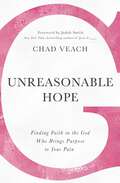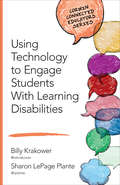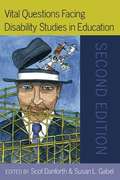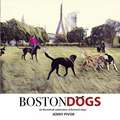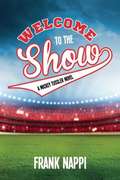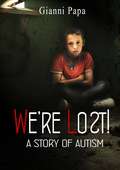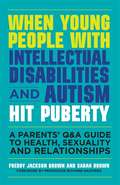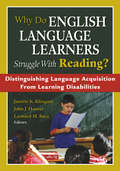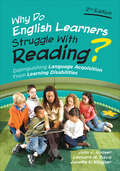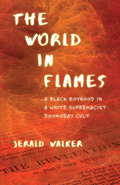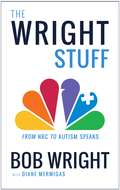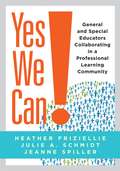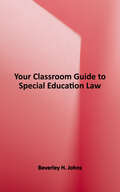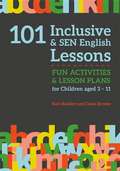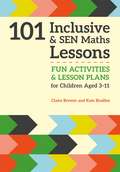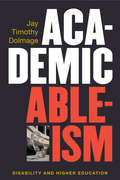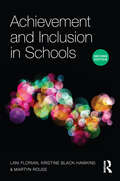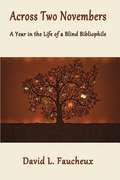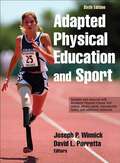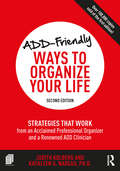- Table View
- List View
Unreasonable Hope: Finding Faith in the God Who Brings Purpose to Your Pain
by Judah Smith Chad Veach"Where was God when ____? How could God allow ____? Why?" These are the questions that flood our hearts and minds when the unimaginable happens. When things go horribly wrong and the world seems to be unraveling, how do you believe in God's goodness? How do you cling to hope? Chad Veach directs readers away from clichéd Sunday school answers that fail to offer real comfort or provide faith-building insights. Instead, he draws from God's promises in the Bible and from the story of his own daughter's diagnosis of a devastating and debilitating disease to reveal simple, purposeful steps for dealing with pain. Resting in God's love, remembering his past faithfulness, and realizing the distinction between having faith and clinging to hope are just some of these steps. Veach reminds us that because we know who God is, we know there is hope.
Using Technology to Engage Students With Learning Disabilities (Corwin Connected Educators Series)
by William A. Krakower Sharon LePage PlanteLeverage technology to engage students with learning disabilities! Harness the power of today’s technology to improve learning and engagement for students with learning disabilities. By engaging students with learning disabilities using the technology already at your fingertips, you’ll see your students begin to thrive and grow in exciting new ways. In this volume in the Connected Educators Series, you’ll discover: New ideas for using assistive technology to teach core subjects and study skills How to build positive opportunities for students to show what they know Tools to provide better content accessibility How to help students connect and share through technology tools
Using Technology to Engage Students With Learning Disabilities (Corwin Connected Educators Series)
by William A. Krakower Sharon LePage PlanteLeverage technology to engage students with learning disabilities! Harness the power of today’s technology to improve learning and engagement for students with learning disabilities. By engaging students with learning disabilities using the technology already at your fingertips, you’ll see your students begin to thrive and grow in exciting new ways. In this volume in the Connected Educators Series, you’ll discover: New ideas for using assistive technology to teach core subjects and study skills How to build positive opportunities for students to show what they know Tools to provide better content accessibility How to help students connect and share through technology tools
Vital Questions Facing Disability Studies in Education
by Susan L. Gabel; Scot DanforthVital Questions Facing Disability Studies in Education provides an overview and introduction to the growing field of disability studies in education, including the application of the interdisciplinary field of disability studies to inclusive education, teacher education, educational research, and educational policy development.
Walk In My Shoes
by ed. Charlotte J. DewittUsher Syndrome is a rare genetic disease that causes deafblindness. This anthology includes 27 authors writing about their experiences.
Walker Finds a Way: Running into the Adult World with Autism
by Robert HughesMost people would describe Walker Hughes as warm, enthusiastic and charismatic - even if he doesn't say very much. But after several happy years living in a group home, Walker descended into a deep unhappiness, and his parents were told that their son with low-functioning autism was 'unmanageable' and a danger to others. Where did it all go wrong? From the author of Running with Walker, this witty and touching memoir tells a story of crisis and recovery of a young man with low-functioning autism. Battling miscommunication, misinterpreted behaviour and a lack of appropriate services, Walker and his parents' resilience shines through, providing a much-needed portrayal about what life is like for adults with low-functioning autism, and how we can understand the complex personalities of people with communication difficulties.
The Weighted Blanket Guide: Everything You Need to Know about Weighted Blankets and Deep Pressure for Autism, Chronic Pain, and Other Conditions
by Cara Koscinski Eileen ParkerProviding everything you need to know about the use of weighted blankets to help with sensory integration, improve sleep, ease chronic pain and more, this book includes: · What a weighted blanket is and how it works · An exploration of deep pressure and how weight on the body affects the mind · Guidelines for using weighted blankets at home and in professional environments · Studies into the effectiveness of weighted blankets · Advice on how to select an appropriate weighted blanket or sew your own. Based on the latest research, this book dispels the online myths surrounding weighted blankets. It delivers clear information for occupational therapists and anyone considering using a weighted blanket to help with sensory processing disorder, autism, sleep disorders, fibromyalgia, post-traumatic stress disorder, and more.
Welcome to the Show: A Mickey Tussler Novel, Book 3 (Mickey Tussler Series #3)
by Frank NappiIt’s 1950 and Mickey Tussler-the now-famous pitching prodigy with autism and a golden arm-is back for another baseball season in this third installment of Frank Nappi’s critically acclaimed Legend of Mickey Tussler series. Talk of Mickey’s legendary exploits on the field has grown since his improbable debut two years prior, as have the fortunes of Murph and the rest of the lovable ragtag Brew Crew. Now Mickey, Murph, and Lester find themselves heading to Bean Town to play for the Boston Braves.The call up is sweet, for all of them have overcome insurmountable odds to get where they are. But life in the major leagues is filled with fast-paced action both on and off the field. The bright lights of Boston hold a new series of challenges, hardships, and life lessons-especially for Mickey, who finds himself a long way from throwing apples into a barrel back on the farm. The three newest Braves have each other to lean on, as well as a new group of fans who are swept away by pennant fever, but balancing everything this new world has to offer may prove to be the greatest challenge of all.Sky Pony Press, with our Good Books, Racehorse and Arcade imprints, is proud to publish a broad range of books for young readers-picture books for small children, chapter books, books for middle grade readers, and novels for young adults. Our list includes bestsellers for children who love to play Minecraft; stories told with LEGO bricks; books that teach lessons about tolerance, patience, and the environment, and much more. While not every title we publish becomes a New York Times bestseller or a national bestseller, we are committed to books on subjects that are sometimes overlooked and to authors whose work might not otherwise find a home.
We're Lost! A Story of Autism
by Margaret Leah McCall Wood Gianni PapaA unique story of autism, where the autistic child is not only the central character but also the narrator and the witness to a harrowing sequence of events. In WE'RE LOST an autistic child tells the story of his difficult birth, the "very good" and terribly optimistic neuropsychiatrist, the diagnosis by a specialist Catholic clinic, the broken dreams of rehabilitation, the clash with reality, the disappointment. The most authentic novel ever written about the plight of families with autism.
When Herscue Met Jomphrey and Other Tales from an Aspie Marriage
by Herscue Bergenstreiml"I knew this guy was out of the square. He was so far out, he was in the hexagonal prism that was past the triangle next to the square." When the author met her future husband, she was instantly charmed by his intensity, wacky conversation choices, and innate desire to create peculiar names. Seventeen years, one wedding, one baby and several adopted names later, it began to dawn on 'Herscue' that family jokes about her husband having Asperger's Syndrome may be closer to the truth than she had first imagined. Filled with moving and hilarious tales, one of which provides the origins of the author and her husband's adopted names, Herscue and Jomphrey, and their even stranger pronunciations, this personal account grapples with the highs and lows of a 25 year marriage to an Aspie husband.
When Young People with Intellectual Disabilities and Autism Hit Puberty: A Parents’ Q&A Guide to Health, Sexuality and Relationships
by Professor Richard Hastings Sarah Brown Freddy Jackson BrownPuberty, personal hygiene and sex can be difficult topics to broach with your child, especially when they have an intellectual disability or autism. The authors of this guide provide honest answers to challenging questions and provide solutions to the dilemmas that many parents face on a daily basis. Structured around issues related to puberty and emerging sexuality in children with disabilities or autism, such as physical changes, mood swings and sexual behaviour, the book presents case studies alongside practical guidance on how to overcome problems that commonly arise. The book also explains laws relevant to disability and sexuality and suggests appropriate sex education programmes to meet the needs of differing degrees of disability.
Why Do English Learners Struggle With Reading?: Distinguishing Language Acquisition From Learning Disabilities
by John J. Hoover Leonard M. Baca Janette Kettmann KlingnerMake the right instructional and eligibility decisions to help your English Learners! Do your students' reading difficulties reflect language acquisition issues or a learning disability? Now in an updated second edition, this essential guide helps educators make informed choices about strategies and services to support English Learners, and includes: Nine common misconceptions that can lead to wrongful placement of students in Special Education A new chapter on evidence-based practices for success in teaching reading to students learning English Appropriate techniques to use when assessing students for special education Expanded coverage of Response to Intervention to include a multi-tiered system of supports (MTSS)
Why Do English Learners Struggle With Reading?: Distinguishing Language Acquisition From Learning Disabilities
by John J. Hoover Leonard M. Baca Janette Kettmann KlingnerMake the right instructional and eligibility decisions to help your English Learners! Do your students' reading difficulties reflect language acquisition issues or a learning disability? Now in an updated second edition, this essential guide helps educators make informed choices about strategies and services to support English Learners, and includes: Nine common misconceptions that can lead to wrongful placement of students in Special Education A new chapter on evidence-based practices for success in teaching reading to students learning English Appropriate techniques to use when assessing students for special education Expanded coverage of Response to Intervention to include a multi-tiered system of supports (MTSS)
Why Do English Learners Struggle With Reading?: Distinguishing Language Acquisition From Learning Disabilities
by John J. Hoover Leonard M. Baca Janette Kettmann KlingnerMake the right instructional and eligibility decisions to help your English Learners! Do your students' reading difficulties reflect language acquisition issues or a learning disability? Now in an updated second edition, this essential guide helps educators make informed choices about strategies and services to support English Learners, and includes: Nine common misconceptions that can lead to wrongful placement of students in Special Education A new chapter on evidence-based practices for success in teaching reading to students learning English Appropriate techniques to use when assessing students for special education Expanded coverage of Response to Intervention to include a multi-tiered system of supports (MTSS)
The World in Flames: A Black Boyhood in a White Supremacist Doomsday Cult
by Jerald Walker<P>A memoir of growing up with blind, African-American parents in a segregated cult preaching the imminent end of the world. <P>When The World in Flames begins, in 1970, Jerry Walker is six years old. His consciousness revolves around being a member of a church whose beliefs he finds not only confusing but terrifying. Composed of a hodgepodge of requirements and restrictions (including a prohibition against doctors and hospitals), the underpinning tenet of Herbert W. Armstrong's Worldwide Church of God was that its members were divinely chosen and all others would soon perish in rivers of flames. <P>The substantial membership was ruled by fear, intimidation, and threats. Anyone who dared leave the church would endure hardship for the remainder of this life and eternal suffering in the next. The next life, according to Armstrong, would arrive in 1975, three years after the start of the Great Tribulation. Jerry would be eleven years old. <P>Jerry's parents were particularly vulnerable to the promise of relief from the world's hardships. When they joined the church, in 1960, they were living in a two-room apartment in a dangerous Chicago housing project with the first four of their seven children, and, most significantly, they both were blind, having lost their sight to childhood accidents. They took comfort in the belief that they had been chosen for a special afterlife, even if it meant following a religion with a white supremacist ideology and dutifully sending tithes to Armstrong, whose church boasted more than 100,000 members and more than $80 million in annual revenues at its height. <P>When the prophecy of the 1972 Great Tribulation does not materialize, Jerry is considerably less disappointed than relieved. When the 1975 end-time prophecy also fails, he finally begins to question his faith and imagine the possibility of choosing a destiny of his own.
The Wright Stuff: From NBC to Autism Speaks
by Bob Wright Diane MermigasThe former CEO of NBC &“reflects on his years at the pinnacle of network television, and also on the Wrights&’ work as co-founders of Autism Speaks&” (Palm Beach Daily News). Named president and CEO of NBC at the age of 43, he faced a two-headed dragon: on one hand, distrust from the network people deeply skeptical of the &“suit&” from GE, their new corporate parent; and on the other, fiscal oversight demands from a cautious, conservative institution reluctant to invest heavily in a media business they didn&’t understand. For the next 20 years, he managed to navigate the fine line between the two and in the process completely reinvent—and save—the network. His name is Bob Wright. Under his leadership, a traditional network, struggling to survive a changing landscape, was transformed into a $45 billion cable and internet giant. What does someone like that do when he retires? If he&’s Bob Wright, he starts all over again. At almost the exact same time as Bob&’s NBC reign was winding down, his grandson Christian was diagnosed with autism, a condition then poorly understood. Baffled by a lack of medical knowledge and community support, Bob and his wife Suzanne founded Autism Speaks, which in short order became the leading advocacy and research funding organization for this mysterious condition that so devastates families. As the two story lines unfold in The Wright Stuff, readers will gradually see that both endeavors—revitalizing NBC and building Autism Speaks—reflect the same key management tenets that apply to any organization facing disruptive change. A portion of the proceeds from this book will be donated to advance autism research.
Yes We Can! General and Special Educators Collaborating in a Professional Learning Community
by Heather Friziellie Julie A. Schmidt Jeanne SpillerAs states adopt more rigorous academic standards, schools must define how special education fits into standards-aligned curricula, instruction, and assessment. Utilizing PLC practices, general and special educators must develop collaborative partnerships in order to close the achievement gap and maximize learning for all. The authors encourage all educators to take collective responsibility in improving outcomes for students with special needs.
Your Classroom Guide to Special Education Law
by Beverley H. JohnsWhen you're teaching students who have special needs, what are your legal responsibilities? How can you provide appropriate, legally compliant special education services--and avoid pitfalls that could lead to due process hearings and court dates? Turn to this interactive quick guide for concise, accessible answers. The antidote to thick, cumbersome legal volumes, this book gives educators and administrators the basics of special education law in an engaging, easy-to-read format. With the jargon-free definitions and reader-friendly descriptions of laws and court cases, you (TM)II build a storehouse of knowledge you can apply in your classroom. And with the thought-provoking activities and real-life scenarios in each chapter, you (TM)II see law-abiding practices in action and put your knowledge to the test so you're ready to fulfill your important responsibilities. An essential addition to every teacher's professional library--and an ideal supplementary text for teachers in training--this guidebook will help you adhere to the law as you teach students with disabilities and special health care needs.
101 Inclusive and SEN English Lessons: Fun Activities and Lesson Plans for Children Aged 3 – 11
by Claire Brewer Kate BradleyCreate an inclusive classroom for all with this resource, full of ideas for engaging and accessible English lessons. Each lesson is tailored to objectives for children working below National Curriculum levels and includes a learning objective, the resources needed, the main activity, a plenary and a consolidation activity to help support children's understanding. When working with children, and especially those with SEN, lessons need to meet their interests as well as their needs by containing visual stimulus and promoting fine and gross motor skills, and the activities in this book have been specifically designed with this in mind. This straightforward and practical book offers you 101 creative classroom activities for teaching English to pupils who are achieving at P Levels 4 - 8, as well as mapping the range of additional skills they will acquire.
101 Inclusive and SEN Maths Lessons: Fun Activities and Lesson Plans for Children Aged 3 – 11 (101 Inclusive And Sen Lessons Ser.)
by Claire Brewer Kate BradleyCreate an inclusive classroom for all through engaging maths activities such as Shape Bingo, Cake Splat! and Fruity Fractions, all of which have been matched to the UK National Curriculum P Levels 4 - 8. Tailored to the specific P Level, each lesson plan includes a learning objective, the resources needed, the main activity, a plenary and a consolidation activity to help support children's understanding. When working with children, and especially those with SEN, lessons need to meet their interests as well as their needs by containing visual stimulus, movement and fine and gross motor skills, and the activities in this book have been specifically designed with this in mind. This straightforward and practical book offers you 101 creative classroom activities for teaching maths to pupils who are achieving at P Levels 4 - 8 and Key Stage One as well as mapping the range of additional skills they will acquire.
Academic Ableism: Disability and Higher Education (Corporealities: Discourses Of Disability)
by Jay T Dolmage<P>Academic Ableism brings together disability studies and institutional critique to recognize the ways that disability is composed in and by higher education, and rewrites the spaces, times, and economies of disability in higher education to place disability front and center. <P>For too long, argues Jay Timothy Dolmage, disability has been constructed as the antithesis of higher education, often positioned as a distraction, a drain, a problem to be solved. The ethic of higher education encourages students and teachers alike to accentuate ability, valorize perfection, and stigmatize anything that hints at intellectual, mental, or physical weakness, even as we gesture toward the value of diversity and innovation. <P> Examining everything from campus accommodation processes, to architecture, to popular films about college life, Dolmage argues that disability is central to higher education, and that building more inclusive schools allows better education for all.
Achievement and Inclusion in Schools
by Lani Florian Kristine Black-Hawkins Martyn RouseThoroughly updated to reflect the challenges of diversity in today’s schools, this new edition of Achievement and Inclusion in Schools shows how high levels of inclusion can be entirely compatible with high levels of achievement and that combining the two is not only possible but also essential if all students are to have the opportunity to participate fully in education. Each chapter has been fully revised to reflect an understanding of inclusion as being concerned with the learning and participation of everyone in a changing education policy context. Based on new case study research, this edition sets out to answer the following questions: Are there strategies which can raise the achievement of all students, while safeguarding the inclusion of others who are more vulnerable? How can schools ensure high levels of inclusion as well as high levels of achievement for everyone? How might research into these matters be carried out? With new case studies in this second edition that reflect the devolution of education policy in the four countries of the UK, this book addresses concerns about how schools can respond to differences between learners without marginalising some of them. It offers guidance to practitioners as well as those undertaking research on this important topic.
Across Two Novembers: A Year in the Life of a Blind Bibliophile
by David Faucheux<P>Friends and family. Restaurants and recipes. Hobbies and history. TV programs the author loved when he could still see and music he enjoys. The schools he attended and the two degrees he attained. The career that eluded him and the physical problems that challenge him. And books, books, books: over 230 of them quoted from or reviewed. All in all, an astonishing work of erudition and remembrance.
Adapted Physical Education And Sport
by Joseph P. Winnick David L. PorrettaThe field of adapted physical education and sport has undergone numerous changes in recent years. This new edition of Adapted Physical Education and Sport will help you stay on top of those changes and, in doing so, provide the highest-quality physical education and sport opportunities for students with disabilities.
ADD-Friendly Ways to Organize Your Life: Strategies that Work from an Acclaimed Professional Organizer and a Renowned ADD Clinician
by Kathleen Nadeau Judith KolbergAcclaimed professional organizer Judith Kolberg and Dr. Kathleen Nadeau, renowned ADHD clinical psychologist, are back with an updated edition of their classic text for adults with ADD. Their collaboration offers the best understanding and solutions for adults who want to get and stay organized. Readers will enjoy all new content on organizing digital information, managing distractions, organizing finances, and coping with the "black hole" of the Internet. This exciting new resource offers three levels of strategies and support: self-help, non-professional assistance from family and friends, and professional support; allowing the reader to determine the appropriate level of support.
